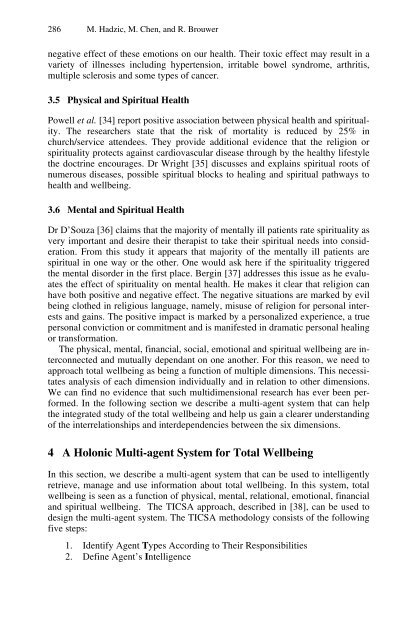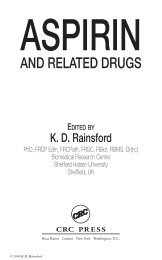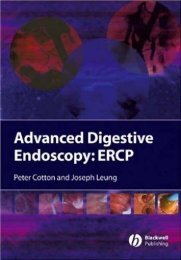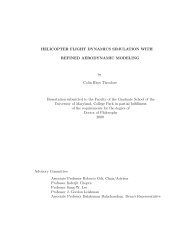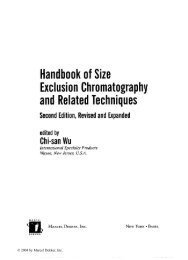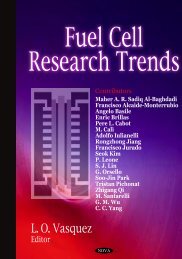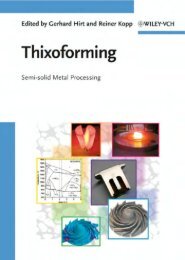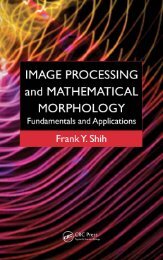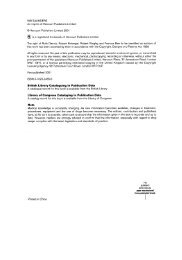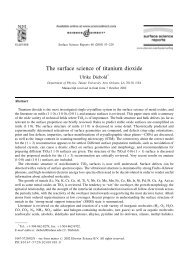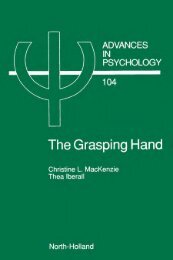- Page 1 and 2:
Amandeep S. Sidhu and Tharam S. Dil
- Page 3 and 4:
Amandeep S. Sidhu and Tharam S. Dil
- Page 5 and 6:
Preface The molecular biology commu
- Page 7 and 8:
Preface VII biomedical systems, and
- Page 9 and 10:
X Contents Mining Clinical, Immunol
- Page 11 and 12:
2 A.S. Sidhu, M. Bellgard, and T.S.
- Page 13 and 14:
4 A.S. Sidhu, M. Bellgard, and T.S.
- Page 15 and 16:
6 A.S. Sidhu, M. Bellgard, and T.S.
- Page 17 and 18:
8 A.S. Sidhu, M. Bellgard, and T.S.
- Page 19 and 20:
Towards Bioinformatics Resourceomes
- Page 21 and 22:
Towards Bioinformatics Resourceomes
- Page 23 and 24:
Towards Bioinformatics Resourceomes
- Page 25 and 26:
2 The New Waves Towards Bioinformat
- Page 27 and 28:
2.4 Semantic Web Towards Bioinforma
- Page 29 and 30:
Towards Bioinformatics Resourceomes
- Page 31 and 32:
Towards Bioinformatics Resourceomes
- Page 33 and 34:
Towards Bioinformatics Resourceomes
- Page 35 and 36:
Towards Bioinformatics Resourceomes
- Page 37 and 38:
Towards Bioinformatics Resourceomes
- Page 39 and 40:
Towards Bioinformatics Resourceomes
- Page 41 and 42:
Towards Bioinformatics Resourceomes
- Page 43 and 44:
A Summary of Genomic Databases: Ove
- Page 45 and 46:
A Summary of Genomic Databases: Ove
- Page 47 and 48:
A Summary of Genomic Databases: Ove
- Page 49 and 50:
A Summary of Genomic Databases: Ove
- Page 51 and 52:
A Summary of Genomic Databases: Ove
- Page 53 and 54:
A Summary of Genomic Databases: Ove
- Page 55 and 56:
A Summary of Genomic Databases: Ove
- Page 57 and 58:
A Summary of Genomic Databases: Ove
- Page 59 and 60:
Appendix A Summary of Genomic Datab
- Page 61 and 62:
Protein Data Integration Problem Am
- Page 63 and 64:
Protein Data Integration Problem 57
- Page 65 and 66:
Protein Data Integration Problem 59
- Page 67 and 68:
Protein Data Integration Problem 61
- Page 69 and 70:
Fig. 3. Class Hierarchy of Protein
- Page 71 and 72:
Protein Data Integration Problem 65
- Page 73 and 74:
Protein Data Integration Problem 67
- Page 75 and 76:
Protein Data Integration Problem 69
- Page 77 and 78:
72 L. Stanescu, D. Dan Burdescu, an
- Page 79 and 80:
74 L. Stanescu, D. Dan Burdescu, an
- Page 81 and 82:
76 L. Stanescu, D. Dan Burdescu, an
- Page 83 and 84:
78 L. Stanescu, D. Dan Burdescu, an
- Page 85 and 86:
80 L. Stanescu, D. Dan Burdescu, an
- Page 87 and 88:
82 L. Stanescu, D. Dan Burdescu, an
- Page 89 and 90:
84 L. Stanescu, D. Dan Burdescu, an
- Page 91 and 92:
86 L. Stanescu, D. Dan Burdescu, an
- Page 93 and 94:
88 L. Stanescu, D. Dan Burdescu, an
- Page 95 and 96:
90 L. Stanescu, D. Dan Burdescu, an
- Page 97 and 98:
92 L. Stanescu, D. Dan Burdescu, an
- Page 99 and 100:
94 L. Stanescu, D. Dan Burdescu, an
- Page 101 and 102:
96 L. Stanescu, D. Dan Burdescu, an
- Page 103 and 104:
98 L. Stanescu, D. Dan Burdescu, an
- Page 105 and 106:
100 L. Stanescu, D. Dan Burdescu, a
- Page 107 and 108:
102 L. Stanescu, D. Dan Burdescu, a
- Page 109 and 110:
104 L. Stanescu, D. Dan Burdescu, a
- Page 111 and 112:
106 L. Stanescu, D. Dan Burdescu, a
- Page 113 and 114:
108 L. Stanescu, D. Dan Burdescu, a
- Page 115 and 116:
110 L. Stanescu, D. Dan Burdescu, a
- Page 117 and 118:
112 L. Stanescu, D. Dan Burdescu, a
- Page 119 and 120:
114 L. Stanescu, D. Dan Burdescu, a
- Page 121 and 122:
116 L. Stanescu, D. Dan Burdescu, a
- Page 123 and 124:
118 L. Stanescu, D. Dan Burdescu, a
- Page 125 and 126:
120 L. Stanescu, D. Dan Burdescu, a
- Page 127 and 128:
122 L. Stanescu, D. Dan Burdescu, a
- Page 129 and 130:
124 L. Stanescu, D. Dan Burdescu, a
- Page 131 and 132:
126 L. Stanescu, D. Dan Burdescu, a
- Page 133 and 134:
128 L. Stanescu, D. Dan Burdescu, a
- Page 135 and 136:
130 L. Stanescu, D. Dan Burdescu, a
- Page 137 and 138:
132 L. Stanescu, D. Dan Burdescu, a
- Page 139 and 140:
134 L. Stanescu, D. Dan Burdescu, a
- Page 141 and 142:
136 L. Stanescu, D. Dan Burdescu, a
- Page 143 and 144:
138 L. Stanescu, D. Dan Burdescu, a
- Page 145 and 146:
140 L. Stanescu, D. Dan Burdescu, a
- Page 147 and 148:
Bio-medical Ontologies Maintenance
- Page 149 and 150:
Bio-medical Ontologies Maintenance
- Page 151 and 152:
Bio-medical Ontologies Maintenance
- Page 153 and 154:
Bio-medical Ontologies Maintenance
- Page 155 and 156:
Bio-medical Ontologies Maintenance
- Page 157 and 158:
Bio-medical Ontologies Maintenance
- Page 159 and 160:
TextToOnto (Maedche and Volz 2001)
- Page 161 and 162:
Bio-medical Ontologies Maintenance
- Page 163 and 164:
Bio-medical Ontologies Maintenance
- Page 165 and 166:
Bio-medical Ontologies Maintenance
- Page 167 and 168:
Bio-medical Ontologies Maintenance
- Page 169 and 170:
Bio-medical Ontologies Maintenance
- Page 171 and 172:
Bio-medical Ontologies Maintenance
- Page 173 and 174:
Extraction of Constraints from Biol
- Page 175 and 176:
Extraction of Constraints from Biol
- Page 177 and 178:
Extraction of Constraints from Biol
- Page 179 and 180:
Extraction of Constraints from Biol
- Page 181 and 182:
Extraction of Constraints from Biol
- Page 183 and 184:
Extraction of Constraints from Biol
- Page 185 and 186:
Extraction of Constraints from Biol
- Page 187 and 188:
Extraction of Constraints from Biol
- Page 189 and 190:
Extraction of Constraints from Biol
- Page 191 and 192:
Classifying Patterns in Bioinformat
- Page 193 and 194:
Classifying Patterns in Bioinformat
- Page 195 and 196:
Classifying Patterns in Bioinformat
- Page 197 and 198:
Classifying Patterns in Bioinformat
- Page 199 and 200:
Classifying Patterns in Bioinformat
- Page 201 and 202:
Classifying Patterns in Bioinformat
- Page 203 and 204:
Classifying Patterns in Bioinformat
- Page 205 and 206:
Classifying Patterns in Bioinformat
- Page 207 and 208:
Classifying Patterns in Bioinformat
- Page 209 and 210:
Classifying Patterns in Bioinformat
- Page 211 and 212:
Classifying Patterns in Bioinformat
- Page 213 and 214:
Classifying Patterns in Bioinformat
- Page 215 and 216:
Mining Clinical, Immunological, and
- Page 217 and 218:
Mining Clinical, Immunological, and
- Page 219 and 220:
Mining Clinical, Immunological, and
- Page 221 and 222:
Mining Clinical, Immunological, and
- Page 223 and 224:
Mining Clinical, Immunological, and
- Page 225 and 226:
Mining Clinical, Immunological, and
- Page 227 and 228:
Mining Clinical, Immunological, and
- Page 229 and 230:
Mining Clinical, Immunological, and
- Page 231 and 232:
Mining Clinical, Immunological, and
- Page 233 and 234:
Mining Clinical, Immunological, and
- Page 235 and 236: Mining Clinical, Immunological, and
- Page 237 and 238: Mining Clinical, Immunological, and
- Page 239 and 240: Mining Clinical, Immunological, and
- Page 241 and 242: Substructure Analysis of Metabolic
- Page 243 and 244: Substructure Analysis of Metabolic
- Page 245 and 246: Substructure Analysis of Metabolic
- Page 247 and 248: Substructure Analysis of Metabolic
- Page 249 and 250: Substructure Analysis of Metabolic
- Page 251 and 252: Substructure Analysis of Metabolic
- Page 253 and 254: entry compound relation subtype com
- Page 255 and 256: Substructure Analysis of Metabolic
- Page 257 and 258: Running Time 4500 4000 3500 3000 25
- Page 259 and 260: Substructure Analysis of Metabolic
- Page 261 and 262: Substructure Analysis of Metabolic
- Page 263 and 264: 6 Conclusion Substructure Analysis
- Page 265 and 266: Substructure Analysis of Metabolic
- Page 267 and 268: 266 J.Y. Chen, S. Taduri, and F. Ll
- Page 269 and 270: 268 J.Y. Chen, S. Taduri, and F. Ll
- Page 271 and 272: 270 J.Y. Chen, S. Taduri, and F. Ll
- Page 273 and 274: 272 J.Y. Chen, S. Taduri, and F. Ll
- Page 275 and 276: 274 J.Y. Chen, S. Taduri, and F. Ll
- Page 277 and 278: 276 J.Y. Chen, S. Taduri, and F. Ll
- Page 279 and 280: 278 J.Y. Chen, S. Taduri, and F. Ll
- Page 281 and 282: Completing the Total Wellbeing Puzz
- Page 283 and 284: Completing the Total Wellbeing Puzz
- Page 285: Completing the Total Wellbeing Puzz
- Page 289 and 290: Completing the Total Wellbeing Puzz
- Page 291 and 292: Completing the Total Wellbeing Puzz
- Page 293 and 294: Completing the Total Wellbeing Puzz
- Page 295 and 296: 296 M. Fernandez, M. Villasana, and
- Page 297 and 298: 298 M. Fernandez, M. Villasana, and
- Page 299 and 300: 300 M. Fernandez, M. Villasana, and
- Page 301 and 302: 302 M. Fernandez, M. Villasana, and
- Page 303 and 304: 304 M. Fernandez, M. Villasana, and
- Page 305 and 306: 306 M. Fernandez, M. Villasana, and
- Page 307 and 308: 308 M. Fernandez, M. Villasana, and
- Page 309 and 310: 310 M. Fernandez, M. Villasana, and
- Page 311 and 312: 312 M. Fernandez, M. Villasana, and
- Page 313 and 314: 314 M. Fernandez, M. Villasana, and
- Page 315 and 316: Genetic Algorithm in Ab Initio Prot
- Page 317 and 318: Genetic Algorithm in Ab Initio Prot
- Page 319 and 320: Genetic Algorithm in Ab Initio Prot
- Page 321 and 322: Genetic Algorithm in Ab Initio Prot
- Page 323 and 324: Genetic Algorithm in Ab Initio Prot
- Page 325 and 326: Genetic Algorithm in Ab Initio Prot
- Page 327 and 328: Genetic Algorithm in Ab Initio Prot
- Page 329 and 330: Genetic Algorithm in Ab Initio Prot
- Page 331 and 332: Genetic Algorithm in Ab Initio Prot
- Page 333 and 334: Genetic Algorithm in Ab Initio Prot
- Page 335 and 336: Genetic Algorithm in Ab Initio Prot
- Page 337 and 338:
Genetic Algorithm in Ab Initio Prot
- Page 339 and 340:
Genetic Algorithm in Ab Initio Prot
- Page 341:
Author Index Apiletti, Daniele 169


